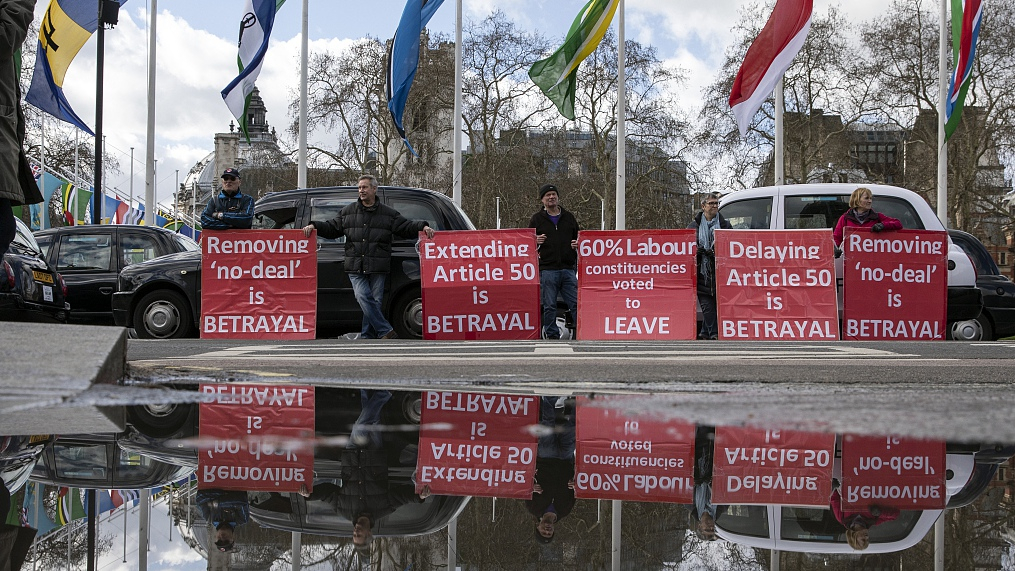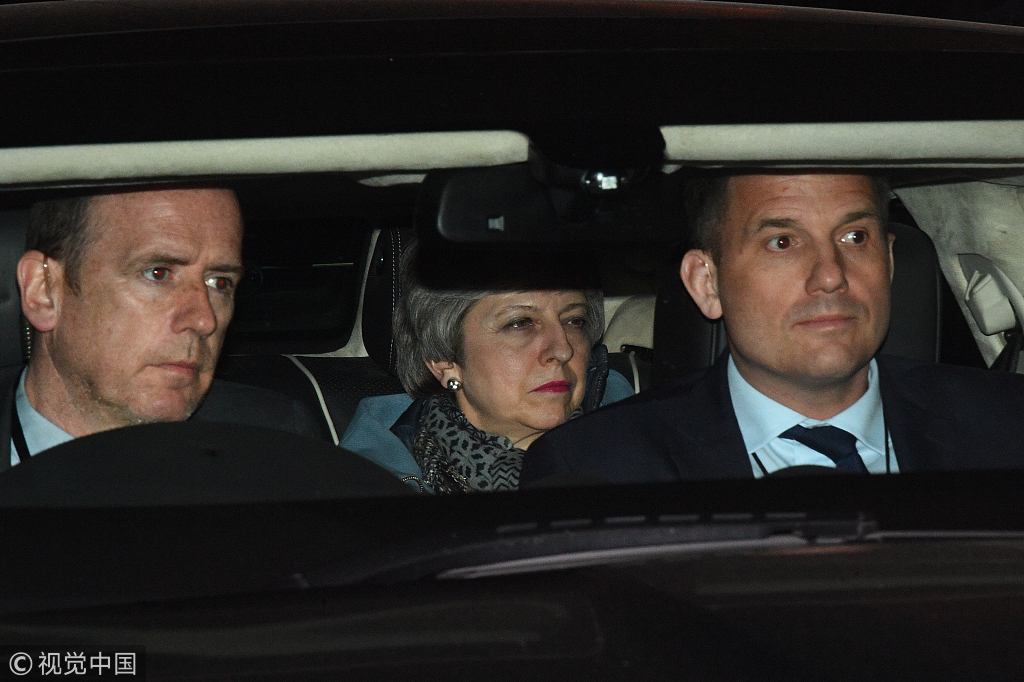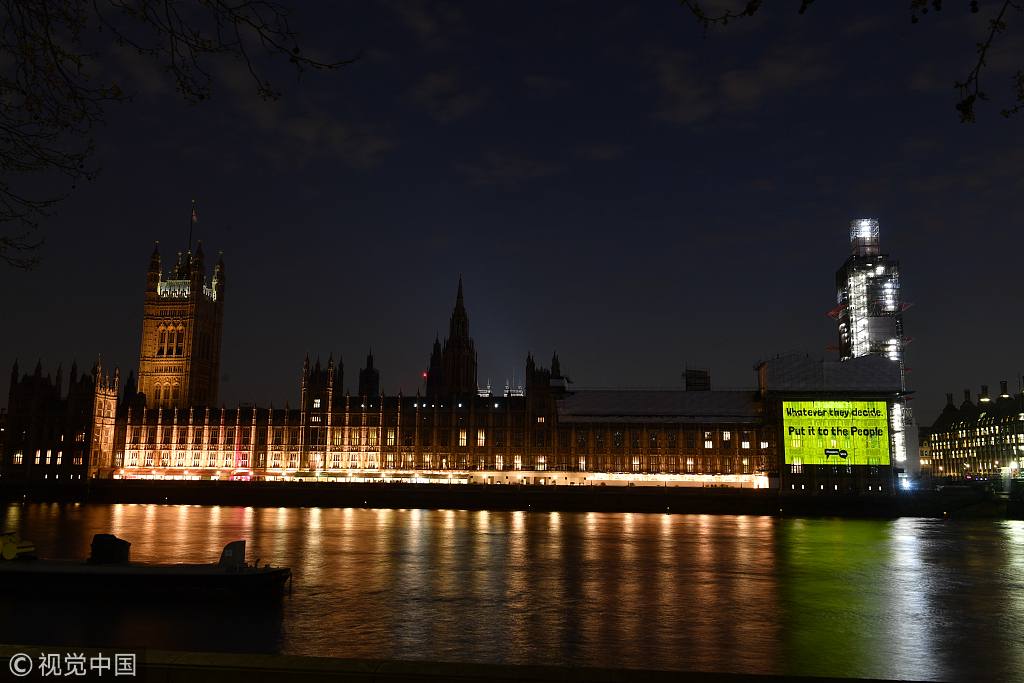
Opinion
14:26, 02-Apr-2019
Parliament's Brexit failure
Tom Fowdy

Editor's note: Tom Fowdy, who graduated with an MSc in Chinese Studies from Oxford University and majored in politics at Durham University, writes on the international relations of China and the Democratic People's Republic of Korea. The article reflects the author's views, and not necessarily those of CGTN.
On Monday night the British House of Commons voted again on a series of motions offering alternatives to Prime Minister Theresa May's withdrawal agreement with Brussels, in light of an April 12 deadline approaching whereby Britain must inform EU leaders what happened next. The votes, however, once again offered no pathway forwards, with MPs again failing to pass any of the recommendations, rendering May's proposals again the only available option for Britain's departure beyond a “no deal” outcome. Facing the heat, the Prime Minister will now convene a cabinet meeting on Tuesday on what to do next. It isn't looking good.
The crisis as a whole is a damning indictment of British Parliamentary politics. Adversarial, divided and tribalistic, many MPs on all sides of the House are continuing to put their own political interests, stakes and point scoring against rivals, above the good of the country as a whole. With this contentious political system failing to provide any kind of leadership, alternative or ability to come together on matters of national interest, once again the call must be made for Theresa May and others to put country before party and ultimately reconsider her position for Britain's future, lest the public permanently lose confidence in the system.

Prime Minister Theresa May leaves the House of Commons, London after MPs fail to back proposals on alternatives to her EU withdrawal deal. /VCG Photo
Prime Minister Theresa May leaves the House of Commons, London after MPs fail to back proposals on alternatives to her EU withdrawal deal. /VCG Photo
Why did the votes fail? First, it's worth reflecting on that the UK House of Commons is infamous for being one of the most divided, polarized and adversarial legislative chambers in the world, simply because its tradition and conventional code of conduct have been built on the idea of rivalry. In the centre of the historic chamber sits a large mace, separating symbolically the two sides of the government and the opposition.
Famously, it places a swords length of distance between the two speakers, to incur the representation of a duel. It is a tradition that dates back to the 14th century, and has produced a culture whereby both British parties contend viciously, scoring cheap points and making as many attacks to the other as possible, not all being honest or particularly truthful.
Thus, it concurrently brings about polarized and partisan bloc voting behaviour. MPs are commanded not to vote on their own consciousness or for the good of Britain itself, but for what their party leadership commands them to do, thus the “whip system." MPs who break this line and rebel, are punished or ostracized by their governing parties, viewed as liabilities.
This bars significant contrast to legislative behavior in the United States. If you look across the Atlantic, despite the oft-pious nature of American politics, you see that the U.S. House and Senate have more space to cooperate and find agreement and cross party lines, where national interest and bipartisanship often play a greater role. Not so in Britain, where it is a political obligation and incentive for the government and opposition to oppose each and every thing the other does. It is a politics of contention.
As last night's votes show, never has this been more problematic on a big stake issue such as Brexit, where such conventions render it so that both leading parties are not prepared to form a pragmatic consensus for the good of Britain itself, but instead offer rival, contending and irreconcilable positions seeking to inflict political defeat on the other. Thus meaning such a series of votes were not really about the good of the country, but a “win-lose” game. Labour MPs sought to undermine the government's Brexit position, Conservative MPs for the most part sought to defend it, despite their inability to even come to terms with their own position.

People's Vote projection onto the Houses of Parliament, London, calling for another vote for the people about Brexit, April 1, 2019. /VCG Photo
People's Vote projection onto the Houses of Parliament, London, calling for another vote for the people about Brexit, April 1, 2019. /VCG Photo
Of course, whilst the run up to the current situation must take some things into account, including the fact that Theresa May lost her own majority (thus making her vulnerable to defeats) and that of course she can't even agree with her own party first (and that is a big criticism), nevertheless, the traditional operations of Parliament rendered both parties ultimately unable to consider compromise on Monday.
Thus, despite that Theresa May's deal had been defeated three times, last night's votes ultimately went amiss with MPs as a whole failing to take them seriously enough in the view of placing the country above party, sticking primarily to their ranks. The motions which were defeated included proposals to join a customs union with the EU, a bid to remain in the European single market, cancelling Article 50 outright and a second referendum. All in all, they were not being presented as a serious attempt at compromise (as they had no legal force), but were at large simply playing across the adversarial party lines.
Thus, with these opportunities wasted and Parliament failing to recommend an alternative, we should expect Theresa May to have no other option but to concede to a longer Brexit extension on April 12 and participate in European Elections. As has been said numerous times, this doesn't offer a hope to change anything. With Britain's system failing the people and bringing about profound disillusionment on all sides of the political spectrum, there is neither other hope nor logical alternative but for the Prime Minister and others to put country before party and call an election. Otherwise, this may prove to be a political crisis which undermines the British system's competence for decades.
(If you want to contribute and have specific expertise, contact us opinions@cgtn.com.)

SITEMAP
Copyright © 2018 CGTN. Beijing ICP prepared NO.16065310-3
Copyright © 2018 CGTN. Beijing ICP prepared NO.16065310-3